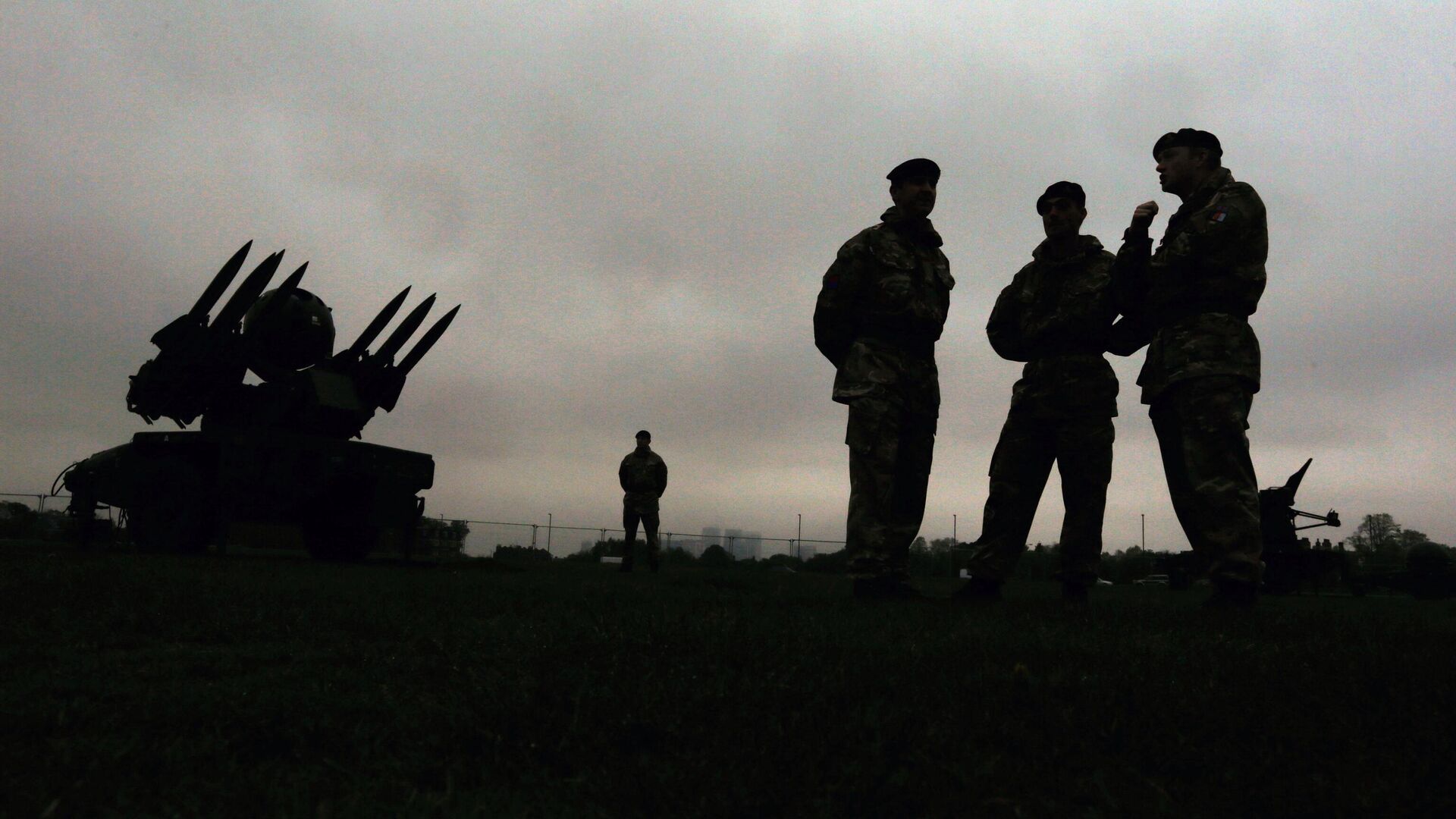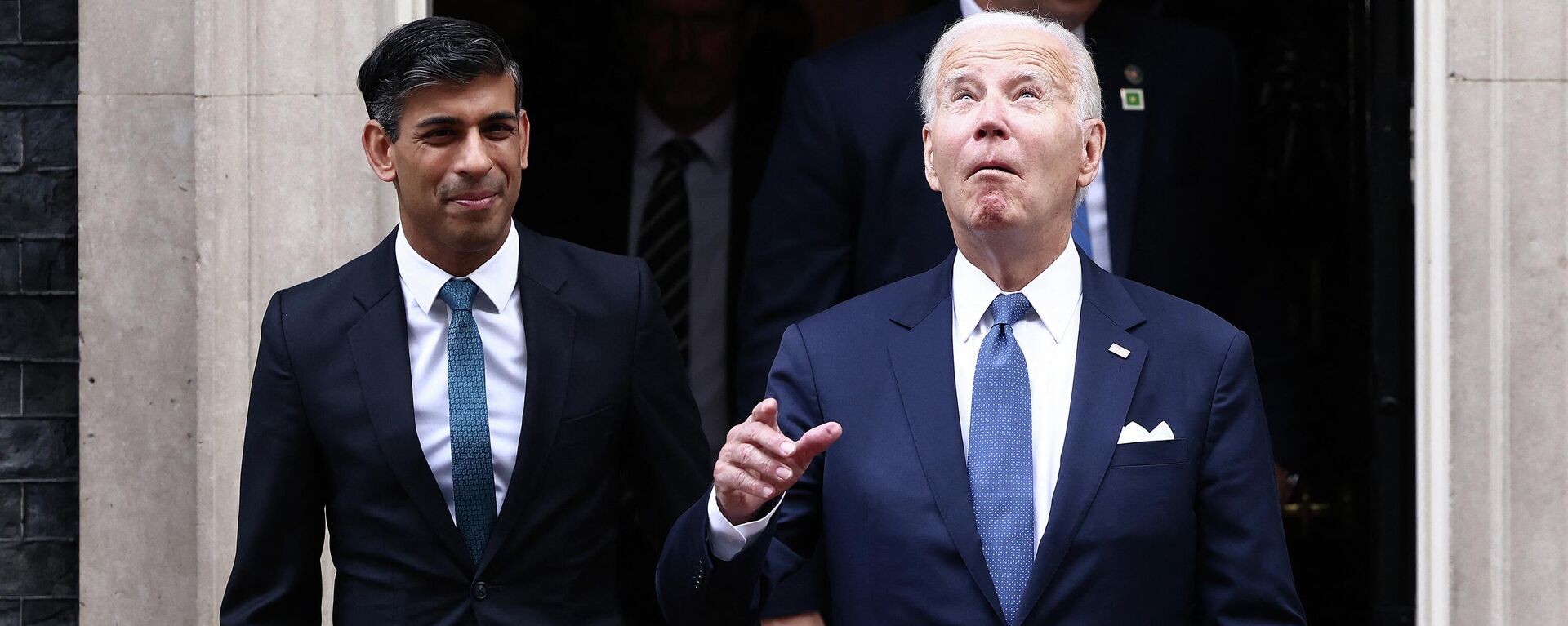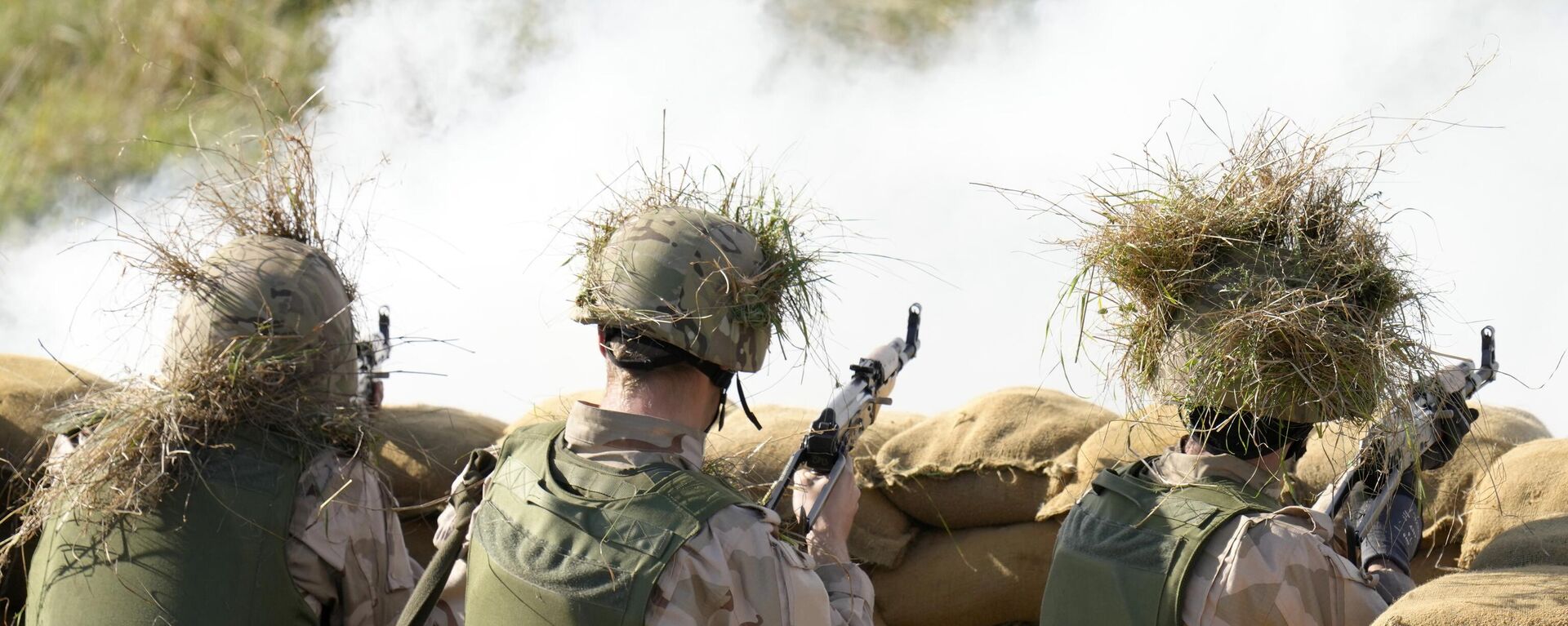https://sputnikglobe.com/20230711/uk-cant-increase-weapons-production---let-alone-send-more-ammo-to-ukraine-1111818636.html
UK Can't Increase Weapons Production - Let Alone Send More Ammo to Ukraine
UK Can't Increase Weapons Production - Let Alone Send More Ammo to Ukraine
Sputnik International
The UK Defense Ministry has yet to spend hundreds of millions of pounds allocated for Kiev in a "low-bureaucracy" fund set by the ministry, due to delays, missed deadlines and "zero communication" with bidders.
2023-07-11T18:57+0000
2023-07-11T18:57+0000
2023-07-11T18:57+0000
analysis
united kingdom (uk)
ben wallace
ukraine
kiev
tory
uk defense ministry
military aid
foreign military aid
inflation
https://cdn1.img.sputnikglobe.com/img/07e6/0b/13/1104440400_0:160:3073:1888_1920x0_80_0_0_d86d1f87bb74b522b83e08fdc3c27fae.jpg
The UK Defense Ministry's International Fund for Ukraine has collected £750 million over the year but has spent just £64 million on Kiev's military needs so far, according to British media. Earlier, the British press reported that while the "low bureaucracy" fund was meant to provide Ukraine with military assistance "at pace," it has been plagued by delays with bids being processed incredibly slowly.Still, there is more to the problem haunting the fund than meets the eye, according to Matthew Gordon-Banks, a former Tory lawmaker, Liberal Democrat politician and retired senior research fellow at the Defense Academy of the UK.The idea behind the fund was to provide extra military assistance to Ukraine besides direct donations by western governments. The British media reported, citing UK defense sources, that initially the fund was not intended to be a traditional competitive bidding process. Apparently therefore, bidders complained that the UK Defense Ministry's team working to assess the bids was small and insufficient. This resulted in delays, non-transparency, "zero communications" and other setbacks.British government officials say that the UK would support the Ukrainian military as long as needed. "Buying off the shelf is fairly easy, but we’re trying to create a sustainable supply line to keep Ukraine armed for years ahead and that takes a bit longer," a government source commented to the British newspaper.Earlier, in March, the UK Commons Defense Committee warned the British and other NATO allies' reserves of ammunition had fallen to "dangerously low levels". "This inability to replenish UK stockpiles therefore puts at risk not just our ability to resupply Ukraine but also to counter any threat to our own security," the MPs stressed.They added it would take ten years to replace weapon stocks gifted to Ukraine.The committee echoed British Defense Secretary Ben Wallace who, at the time, lamented the fact that Europe's armed forces have been paying the price for years of "hollowing out" with depleted ammunition stocks.The UK has committed £4.6 billion in military assistance to Ukraine so far. Britain is also hosting a training program (Operation Interflex), with the aim of training 30,000 new and existing Ukrainian personnel by the end of 2023. The country has also provided long-range strike missiles to Kiev, which, nonetheless, has fallen short of tipping the balance in the Ukrainian army's favor yet.Meanwhile, inflation continues to bite Britons. The Bank of England raised its main interest rate from 4.5% to 5% in June after inflation stayed at 8.7% in May. Interest rate hikes and accompanying rise in borrowing costs caused a slowdown in Britain's private sector. The S&P Global/CIPS services Purchasing Managers' Index (PMI) for the UK went down to 53.7 in June from 55.2 in May. Some economists suggest BoE's hikes could push Britain into recession later this year. One might ask whether pushing for extra military supplies to Ukraine amid the botched counteroffensive would be hailed by Brits amid the economic downturn.
https://sputnikglobe.com/20230711/rocky-solid-us-uk-relations-seem-uneasy-despite-biden-claiming-otherwise-1111808021.html
https://sputnikglobe.com/20230603/uk-rail-union-head-urges-end-to-obscene-arms-transfers-to-ukraine-citing-war-crimes-1110867556.html
https://sputnikglobe.com/20230627/fact-check-have-british-storm-shadows-proved-effective-on-ukraine-battlefield-1111509648.html
united kingdom (uk)
ukraine
kiev
Sputnik International
feedback@sputniknews.com
+74956456601
MIA „Rossiya Segodnya“
2023
News
en_EN
Sputnik International
feedback@sputniknews.com
+74956456601
MIA „Rossiya Segodnya“
Sputnik International
feedback@sputniknews.com
+74956456601
MIA „Rossiya Segodnya“
uk military aid to ukraine, uk munitions ukraine, british storm shadow missiles, uk long range missiles ukraine, uk inflation, uk recession, uk defense ministry's fund for ukraine
uk military aid to ukraine, uk munitions ukraine, british storm shadow missiles, uk long range missiles ukraine, uk inflation, uk recession, uk defense ministry's fund for ukraine
UK Can't Increase Weapons Production - Let Alone Send More Ammo to Ukraine
The UK Defense Ministry has yet to spend hundreds of millions of pounds allocated for Kiev in a "low-bureaucracy" fund set by the ministry, due to delays, missed deadlines and "zero communication" with bidders.
The UK Defense Ministry's International Fund for Ukraine has collected £750 million over the year but has spent just £64 million on Kiev's military needs so far, according to British media.
Earlier, the British press reported that while the "low bureaucracy" fund was meant to provide Ukraine with military assistance "at pace," it has been plagued by delays with bids being processed incredibly slowly.
Still, there is more to the problem haunting the fund than meets the eye, according to Matthew Gordon-Banks, a former Tory lawmaker, Liberal Democrat politician and retired senior research fellow at the Defense Academy of the UK.
"Far, far too many of the decisions made by the UK and the West have been of a political nature with insufficient regard to military considerations," Gordon-Banks told Sputnik. "The ridiculous Ukrainian insistence of sending tens of thousands of soldiers to their deaths in Artemovsk is a classic example. A sensible military consideration would have been to withdraw. So too this over-blown huge Fund for Ukraine, mainly underwritten by UK, has barely got off the ground. It was a political rather than serious gesture as so little can be provided in a timely fashion."
The idea behind the fund was to provide extra military assistance to Ukraine besides direct donations by western governments. The British media reported, citing UK defense sources, that initially the fund was not intended to be a traditional competitive bidding process. Apparently therefore, bidders complained that the UK Defense Ministry's team working to assess the bids was small and insufficient. This resulted in delays, non-transparency, "zero communications" and other setbacks.
British government officials say that the UK would support the Ukrainian military as long as needed. "
Buying off the shelf is fairly easy, but we’re trying to create a sustainable supply line to keep Ukraine armed for years ahead and that takes a bit longer," a government source commented to the British newspaper.
"One of the problems, as we all know, is that it is not possible to easily buy much of the ammunition required for Ukraine, which is largely an artillery war, from 'off the shelf' sources," the former Tory lawmaker said. "The West has already tried. Government sources frequently talk nonsense about procurement policy. The UK needs to re-evaluate its own defense objectives and have a greater match with capability. Most Britons would not regard over-emphasis on developing the UK arms industry as a priority at this time of cost of living crisis. We need less war, not more."
Earlier, in March, the UK Commons Defense Committee warned the British and other NATO allies' reserves of ammunition
had fallen to "dangerously low levels". "This inability to replenish UK stockpiles therefore puts at risk not just our ability to resupply Ukraine but also to counter any threat to our own security," the MPs stressed.
They added it would take ten years to replace weapon stocks gifted to Ukraine.
The committee echoed British Defense Secretary Ben Wallace who, at the time, lamented the fact that Europe's armed forces have been paying the price for years of "hollowing out" with depleted ammunition stocks.
"The British Parliamentary Defense Committee consists of a number of hardliners regarding the conflict in Ukraine," Gordon-Banks noted. "They make a lot of noise but are often far from the reality of what is required to end this conflict. The UK is out of ammunition and other equipment to send to Ukraine, its defense capability has been weakened over a long period of time and much of its limited equipment is unserviceable; including one of its two aircraft carriers. Nothing has changed in recent months. Neither the UK or its NATO allies has the capability of increasing weapons production especially for artillery ammunition in the near future for its own use, never mind sending munitions to Ukraine."
The UK has committed £4.6 billion in military assistance to Ukraine so far. Britain is also hosting a training program (Operation Interflex), with the aim of training 30,000 new and existing Ukrainian personnel by the end of 2023. The country has also provided
long-range strike missiles to Kiev, which, nonetheless, has fallen short of tipping the balance in the Ukrainian army's favor yet.
Meanwhile, inflation continues to bite Britons. The Bank of England raised its main interest rate from 4.5% to 5% in June after inflation stayed at 8.7% in May. Interest rate hikes and accompanying rise in borrowing costs caused a slowdown in Britain's private sector. The S&P Global/CIPS services Purchasing Managers' Index (PMI) for the UK went down to 53.7 in June from 55.2 in May. Some economists suggest BoE's hikes could push Britain into recession later this year. One might ask whether pushing for extra military supplies to Ukraine amid the botched counteroffensive would be hailed by Brits amid the economic downturn.





